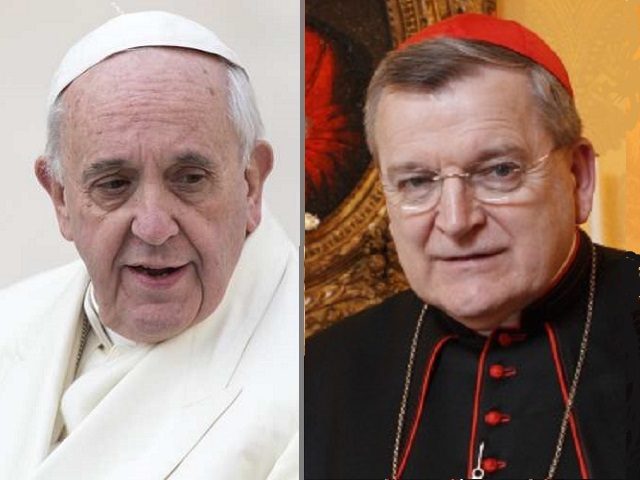Cardinal Raymond Burke has once again voiced deep concern over the direction the Catholic Church is taking under Pope Francis, saying that the pope “not only refuses to clarify things” by clearly proclaiming Catholic doctrine but also “feeds confusion” in the Church.
In an interview with La Nuova Bussola Quotidiana, the American cardinal—a prominent canon lawyer who formerly headed up the Vatican’s highest court—took recent media reports of the pope’s denial of the existence of hell as his point of departure.
The pope’s latest interview with Eugenio Scalfari, made public on Holy Thursday, “went beyond what is tolerable,” the cardinal declared. “For a famous atheist to claim to announce a revolution in the teaching of the Catholic Church, claiming to speak in the name of the pope, denying the immortality of the human soul and the existence of hell, has been a source of deep scandal not only for many Catholics but also for many nonbelievers who respect the Catholic Church and her teachings, even if they do not share them.”
The cardinal was referring to an article in the Italian daily La Repubblica, in which the newspaper’s founder, Eugenio Scalfari, claimed that the pope had told him in a recent meeting that he believes that people who live bad lives do not go to hell, but rather “disappear” and cease to exist.
The problem went beyond the misguided article, the cardinal said, because the Vatican’s official response to the scandalous assertions was also misleading and failed to address the real problem.
“The response of the Holy See to the scandalized reactions from all over the world was profoundly inadequate,” Burke said. “Instead of clearly reaffirming the truth about the immortality of the human soul and hell, the denial merely says that some of words quoted are not the pope’s. It does not say that the erroneous, even heretical ideas expressed in these words are not shared by pope and that the pope repudiates these ideas as contrary to the Catholic faith.”
“This playing around with faith and doctrine, at the highest level of the Church, rightfully leaves both pastors and the faithful scandalized,” he said.
In his interview, Cardinal Burke also wondered aloud why the Vatican did not take issue with Scalfari’s portrayal of the pope as a “revolutionary.”
“It is the essential service of the Pope to safeguard and promote the deposit of faith, true doctrine and healthy discipline consistent with the truths believed. In the interview already mentioned with Eugenio Scalfari, the Pope is approvingly referred to as ‘revolutionary,’” he noted.
The Petrine Office “has nothing, absolutely nothing to do with revolution,” Burke insisted. “On the contrary, it exists exclusively for the preservation and propagation of the unchanging Catholic faith which leads souls to a conversion of heart and leads all humanity to unity founded on the order God inscribed in his creation and especially in the heart of man, the only earthly creature made in the image of God.”
Cardinal Burke insisted that Catholics are called to foster respect for the office and person of the pope as successor of Saint Peter and visible head of the Church. On the other hand, if the pope misguides the faithful by his words or actions, it is the duty of the members of the Church and especially her pastors to exercise “fraternal correction,” he said.
The pope enjoys all the authority necessary to safeguard and promote true faith, divine worship, and sound discipline, Burke said. “In the past, for the most part, the popes have not publicized their personal actions or their opinions, in order not to risk confusing the faithful about what the successor of St. Peter does and thinks.”
Currently, there is a risky and even harmful confusion between the person of the Pope and his office, which results in “a worldly and political concept of the service of the Roman Pontiff in the Church,” he said.
Since the Church exists for the salvation of souls, he said, any action of a Pope “that undermines the saving mission of Christ in the Church, either a heretical act or a sinful act, is simply empty from the point of view of the Petrine Office,” he said.
In concluding the interview, the cardinal insisted that expressing criticism of the pope is not a manifestation of “rebellion or disobedience,” as some have claimed, because seeking to correct confusion or error “is not an act of disobedience, but an act of obedience to Christ and therefore to his vicar on earth,” he said.
Follow Thomas D. Williams on Twitter Follow @tdwilliamsrome

COMMENTS
Please let us know if you're having issues with commenting.